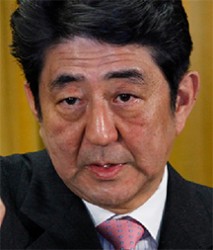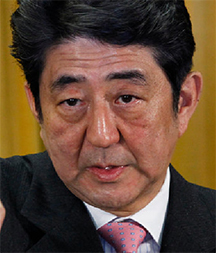TOKYO, (Reuters) – Japan took a historic step away from its post-war pacifism yesterday by ending a ban that has kept the military from fighting abroad since 1945, a victory for Prime Minister Shinzo Abe but a move that has riled China and worries many Japanese voters.

The change, the most dramatic policy shift since Japan set up its post-war armed forces 60 years ago, will widen Japan’s military options by ending the ban on exercising “collective self-defence”, or aiding a friendly country under attack.
Abe’s cabinet adopted a resolution outlining the shift, which also relaxes limits on activities in U.N.-led peace-keeping operations and “grey zone” incidents short of full-scale war, Defence Minister Itsunori Onodera told reporters.
Long constrained by the post-war constitution, Japan’s armed forces will become more aligned with the militaries of other advanced nations in terms of its options. However, Tokyo will be wary of putting boots on the ground in multilateral operations such as the 2003 U.S.-led invasion of Iraq.
Abe repeated that stance on Tuesday, while stressing Japan had to respond to an increasingly tough security environment.
“There is no change in the general principle that we cannot send troops overseas,” Abe told a televised news conference, flanked by a poster showing Japanese mothers and infants fleeing a theoretical combat zone on a U.S. vessel under attack.
The United States, which defeated Japan in World War Two then became its close ally with a security cooperation treaty, welcomed the Japanese move and said it would make the U.S.-Japan alliance more effective.“This decision is an important step for Japan as it seeks to make a greater contribution to regional and global peace and security,” Defense Secretary Chuck Hagel said in a statement.
“The United States has an enduring interest in the Asia-Pacific’s peace and prosperity, and our alliance with Japan is critical to our strategy in the region,” Hagel said.
Hagel added that he looked forward to discussing Japan’s decision when Onodera visits Washington next week.
Washington has long urged Tokyo to become a more equal alliance partner and Japan’s move will also be welcomed by Southeast Asia nations that like Tokyo have territorial rows with an increasingly assertive China.
Tokyo’s new policy has angered China, whose ties with Japan have frayed due to a maritime row, mistrust and the legacy of past Japanese military aggression.
“China opposes the Japanese fabricating the China threat to promote its domestic political agenda,” Chinese Foreign Ministry spokesman Hong Lei told a news conference in Beijing.
“We demand that Japan respect the reasonable security concerns of its Asian neighbors and prudently handle the relevant matter.”
South Korea, like Japan allied with the United States, but still aggrieved about Tokyo’s 20th century colonisation of the Korean peninsula, said it would not accept any change in policy affecting its security unless it gave its agreement.
Abe’s advisers have said Tokyo should take no action involving a friendly country without that country’s consent.
Conservatives say the constitution’s war-renouncing Article 9 has limited Japan’s ability to defend itself and that a changing regional power balance, including a rising China, means policies must be more flexible.
“Conservative governments have pushed the envelope hard and often to get the public to agree to a more elastic interpretation of article 9. Abe is taking a bigger leap and getting away with it, thanks to the Chinese,” said Columbia University political science professor Gerry Curtis.
Abe, who took office in 2012 promising to revive Japan’s economy and bolster its security posture, has pushed for the change – which revises a longstanding government interpretation of the charter – despite wariness among ordinary Japanese.
VOTERS WARY
Some voters worry about entanglement in foreign wars and others are angry at what they see as a gutting of Article 9 by ignoring formal amendment procedures. The charter has never been revised since it was adopted after Japan’s 1945 defeat.
On Sunday, a man set himself on fire near a busy Tokyo intersection – a rare form of protest in Japan – after speaking out against Abe’s re-interpretation of Article 9.
While Abe spoke, thousands of protesters, including pensioners, housewives and employees just leaving work, gathered near the premier’s office carrying banners and shouting, “Don’t destroy Article 9”, “We’re against war” and “No more Abe”.
“After this bill is enacted, Japanese soldiers could be sent abroad to fight foreign wars – we don’t want that,” said Yoshiharu Uchinuma, 62, an artist and farmer, wearing a helmet saying “9 No War”.

